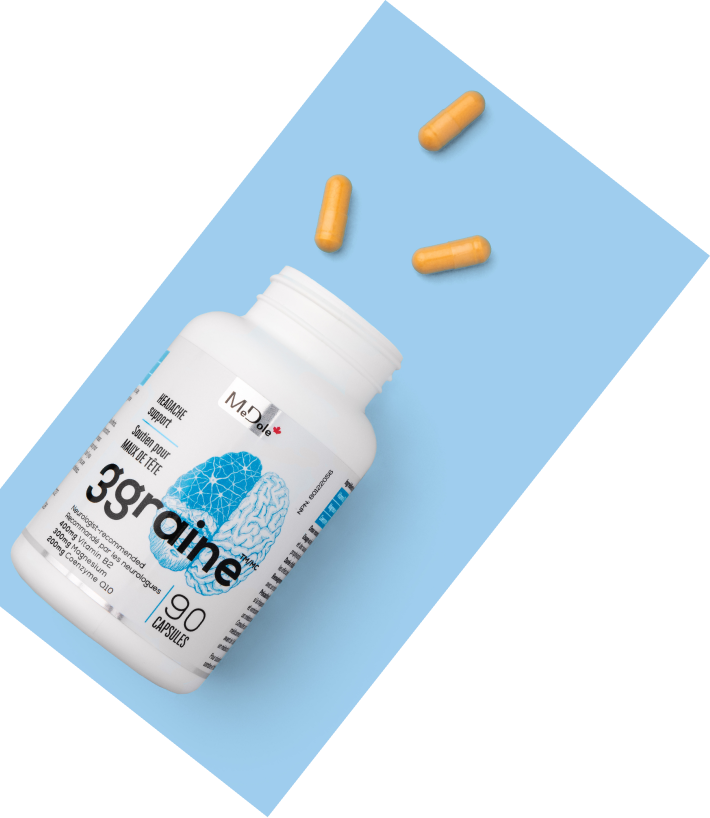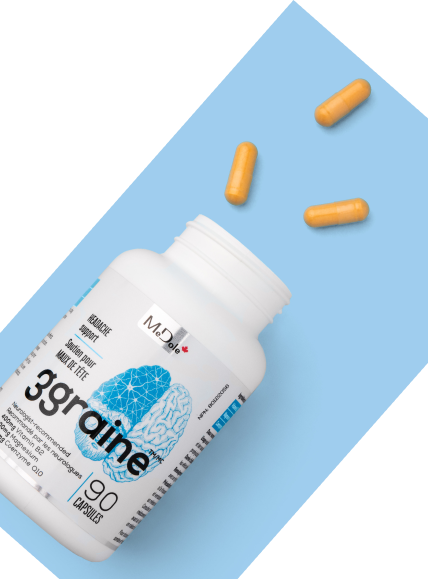THE
INGREDIENTS
Each ingredient and dose is backed by clinical experience and research





Vitamin B2 (Riboflavin)
Vitamin B2 (also known as riboflavin) plays a vital role in the body’s energy metabolism by enhancing the mitochondrial function. Besides its importance in energy production and the balance of our brain chemistry, it also aids in balancing out neurotransmitter levels, does DNA repairs, and provides antioxidant protection. It has also shown considerable promise in reducing the frequency, duration, and intensity of migraines, with numerous clinical studies supporting the use of a daily dose of 400mg.


Magnesium (Citrate)
Magnesium is integral to numerous biochemical reactions in our bodies, helping to maintain the functioning of the brain, supporting nerve cell activity, and reducing excessive stimulation in the central nervous system. Its importance in overall body chemistry makes it the go-to ally against headaches and migraine.
A daily intake of about 300-500mg of magnesium citrate, preferred for its absorbability, shows potential in combating these conditions. Through our clinical experience and evidence-based research, we’ve managed to optimize the dose of magnesium in 3graine to help reduce the chances of side effects (like loose stool and diarrhea).


Coenzyme Q10
Coenzyme Q10, present in all of our cells, serves as a potent antioxidant, safeguarding cells from damaging by-products of cellular energy production and reducing inflammation overall. It is essential to combat cellular damage, a trigger for migraines. As we age, coenzyme Q10 levels naturally decline, possibly elevating the risk of migraine.
A systematic review and meta-analysis of various clinical trials suggested that supplementing with coenzyme Q10, between 100-400mg per day, could reduce the frequency of migraine attacks considerably.





REFERENCES

Alghadeer, S. (2016). The efficacy of different oral magnesium supplements for migraine prevention: A literature review. Indonesian Journal of Pharmacy.

Chen, Y. S., Lee, H. F., Tsai, C. H., Hsu, Y. Y., Fang, C. J., Chen, C. J., Hung, Y. H., & Hu, F. W. (2022). Effect of Vitamin B2 supplementation on migraine prophylaxis: a systematic review and meta-analysis. Nutritional neuroscience, 25(9), 1801–1812.

Parohan, M., Sarraf, P., Javanbakht, M. H., Ranji-Burachaloo, S., & Djalali, M. (2020). Effect of coenzyme Q10 supplementation on clinical features of migraine: a systematic review and dose-response meta-analysis of randomized controlled trials. Nutritional neuroscience, 23(11), 868–875.

Peikert, A., Wilimzig, C., & Köhne-Volland, R. (1996). Prophylaxis of migraine with oral magnesium: results from a prospective, multi-center, placebo-controlled and double-blind randomized study. Cephalalgia : an international journal of headache, 16(4), 257–263.

Sándor, P. S., Di Clemente, L., Coppola, G., Saenger, U., Fumal, A., Magis, D., Seidel, L., Agosti, R. M., & Schoenen, J. (2005). Efficacy of coenzyme Q10 in migraine prophylaxis: a randomized controlled trial. Neurology, 64(4), 713–715.

Sifuentes-Franco, S., Sánchez-Macías, D. C., Carrillo-Ibarra, S., Rivera-Valdés, J. J., Zuñiga, L. Y., & Sánchez-López, V. A. (2022). Antioxidant and Anti-Inflammatory Effects of Coenzyme Q10 Supplementation on Infectious Diseases. Healthcare (Basel, Switzerland), 10(3), 487.

Sun-Edelstein, C., & Mauskop, A. (2009). Role of magnesium in the pathogenesis and treatment of migraine. Expert review of neurotherapeutics, 9(3), 369–379.

Tarighat Esfanjani, A., Mahdavi, R., Ebrahimi Mameghani, M., Talebi, M., Nikniaz, Z., & Safaiyan, A. (2012). The effects of magnesium, L-carnitine, and concurrent magnesium- L-carnitine supplementation in migraine prophylaxis. Biological trace element research, 150(1-3), 42–48.
*The above researchers are not affiliated with 3graine.

Alghadeer, S. (2016). The efficacy of different oral magnesium supplements for migraine prevention: A literature review. Indonesian Journal of Pharmacy.

Chen, Y. S., Lee, H. F., Tsai, C. H., Hsu, Y. Y., Fang, C. J., Chen, C. J., Hung, Y. H., & Hu, F. W. (2022). Effect of Vitamin B2 supplementation on migraine prophylaxis: a systematic review and meta-analysis. Nutritional neuroscience, 25(9), 1801–1812.

Parohan, M., Sarraf, P., Javanbakht, M. H., Ranji-Burachaloo, S., & Djalali, M. (2020). Effect of coenzyme Q10 supplementation on clinical features of migraine: a systematic review and dose-response meta-analysis of randomized controlled trials. Nutritional neuroscience, 23(11), 868–875.

Peikert, A., Wilimzig, C., & Köhne-Volland, R. (1996). Prophylaxis of migraine with oral magnesium: results from a prospective, multi-center, placebo-controlled and double-blind randomized study. Cephalalgia : an international journal of headache, 16(4), 257–263.

Sándor, P. S., Di Clemente, L., Coppola, G., Saenger, U., Fumal, A., Magis, D., Seidel, L., Agosti, R. M., & Schoenen, J. (2005). Efficacy of coenzyme Q10 in migraine prophylaxis: a randomized controlled trial. Neurology, 64(4), 713–715.

Sifuentes-Franco, S., Sánchez-Macías, D. C., Carrillo-Ibarra, S., Rivera-Valdés, J. J., Zuñiga, L. Y., & Sánchez-López, V. A. (2022). Antioxidant and Anti-Inflammatory Effects of Coenzyme Q10 Supplementation on Infectious Diseases. Healthcare (Basel, Switzerland), 10(3), 487.

Sun-Edelstein, C., & Mauskop, A. (2009). Role of magnesium in the pathogenesis and treatment of migraine. Expert review of neurotherapeutics, 9(3), 369–379.

Tarighat Esfanjani, A., Mahdavi, R., Ebrahimi Mameghani, M., Talebi, M., Nikniaz, Z., &
Safaiyan, A. (2012). The effects of magnesium, L-carnitine, and concurrent magnesium-
L-carnitine supplementation in migraine prophylaxis. Biological trace element
research, 150(1-3), 42–48.
*The above researchers are not affiliated with 3graine.
